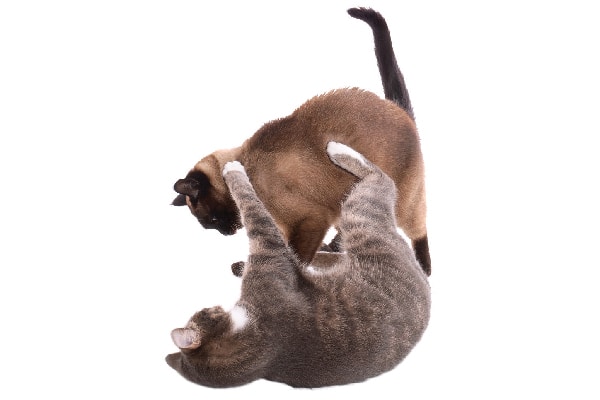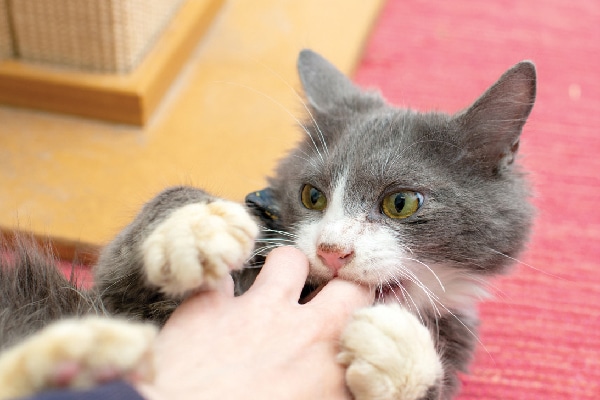The post Why Do Cats Bite? by Susan Logan McCracken appeared first on Catster. Copying over entire articles infringes on copyright laws. You may not be aware of it, but all of these articles were assigned, contracted and paid for, so they aren't considered public domain. However, we appreciate that you like the article and would love it if you continued sharing just the first paragraph of an article, then linking out to the rest of the piece on Catster.com.
They may not speak our language, but cats are prolific communicators. They communicate through vocalization, purring, hissing, tail movements and numerous other nonverbal devices. When they want to make a bold statement, they bite. So, why do cats bite?
“The reasons for biting are legion,” says cat behavior expert Dusty Rainbolt, who writes about feline health and behavior. Having rescued and rehomed more than 1,500 cats since 1986 through fostering and other rescue programs, Dusty has lost count of the number of cat bites she has witnessed. She shares just a few of the answers to the question, “Why do cats bite?”
1. Health problems and pain
Clik here to view.

Two cats wrestling and fighting. Photography ©axelbueckert | Getty Images.
Any time you notice a behavioral change in your cat, first rule out a health problem. “If you have a cat who has never bitten before and all of the sudden starts biting, you need to go to the vet,” Dusty says.
So, why do cats bite? Sometimes it’s because of physical discomfort. “Cats can’t tell you, ‘I hurt,’” Dusty says. “Cats don’t do things because they’re bad cats; they do things because it’s the only way to get a message across.”
Health conditions that could prompt a cat to bite include dental problems, arthritis, constipation and hyperesthesia syndrome, a skin condition that can make the cat feel pain when touched or cause the sensation of having fleas. A cat experiencing arthritic joint pain might bite the child who squeezes him, “because they can’t say, ‘Leave me alone,’” Dusty says.
Declawed cats tend to bite more, not just because they can’t defend themselves with their claws. One study, “Pain and adverse behavior in declawed cats,” published May 2017 in the Journal of Feline Medicine and Surgery, concluded that declawing increased the risk of pain and unwanted behaviors in cats.
2. Aggressive play
Another answer to the question, “Why do cats bite?” Aggressive play. For kittens and cats, playing is training for hunting and fighting. In the wild, cats have to hunt for food and fight for self-defense. Kittens will play bite their littermates and anything that moves, including human hands and feet. As adorable as this might be when they’re kittens, you don’t want to encourage this behavior because cat bites can puncture skin and cause infection. Instead, redirect play biting to cat toys.
“Aggressive play is what a cat has to do to survive,” Dusty says. Instead of stopping cats from doing it, she recommends satisfying the cat’s natural need to bite and chase with toys that mimic prey. Try to make the toy act like prey, taking a few steps, then stopping to wiggle the toy and repeating these moves, making sure the cat can catch it to avoid frustrating him.
3. Defense and offense
Self-defense or dominance are more answers to the question, “Why do cats bites?” How do you know your cats are truly fighting and not playing? “There’s more yowling and vocalization in a real fight and a stare down before the attack,” Dusty says. “Usually the cat doing the staring is the aggressive one. The cat making the noise or yowling is on the defense. The one on offense doesn’t need to make noise.”
If your cats are fighting, Dusty recommends making a noise that distracts them and separating them without touching them. Serious biting can cause an abscess, and that’s a trip to the vet, she says. Don’t touch the cats when they are in this aggravated state.
Sometimes cats will bite out of fear. “If you see the body language closed up or trying to look big, the cat is afraid,” Dusty says. A dog or another cat could be outside. Regardless of the reason, it’s not a good time to pick up your cat, because cats experience something called redirected aggression. That means they take out their aggression on someone who is not the cause of the agitation. “When you see that your cat is in an agitated state, leave him alone and let him calm down,” Dusty says.
Pay attention to your cat’s nonverbal clues to find out what he needs and avoid getting bitten.
4. Love bites and petting
Clik here to view.

Why do cats bite when you’re petting them? Photography ©Casey Elise Photography.
Why do cats bite you when you’re petting them? Or why do cats bite you when they’re licking you or otherwise seemingly happy? You may have heard of cat love bites, and it’s true that cats sometimes bite the ones they love. Love bites usually do not penetrate the skin, though, unless you panic and yank your hand away.
Mirroring how a mother cat grooms her kittens, love bites are gentle and are usually followed by licking. Cats often groom themselves by biting and licking. You could call it the feline version of scrubbing and rinsing.
Sometimes cats bite when they become overstimulated from petting. Individual cats seem to have their own thresholds of how much stimulation they can tolerate. A cat who has received enough petting will look back at your hand.
Dusty recommends watching the ears and tail. If the ears go back and the tail starts moving, stop petting the cat.
Thumbnail: Photography ©Nungning20 | Getty Images.
About the author
Author and Editor Susan Logan-McCracken shares her home with her husband, Mark, and two red tabby domestic longhaired cats, Maddie and Sophie.
Editor’s note: This article originally appeared in Catster magazine. Have you seen the new Catster print magazine in stores? Or in the waiting area of your vet’s office? Click here to subscribe to Catster and get the bimonthly magazine delivered to your home.
Read more about cat behavior on Catster.com:
The post Why Do Cats Bite? by Susan Logan McCracken appeared first on Catster. Copying over entire articles infringes on copyright laws. You may not be aware of it, but all of these articles were assigned, contracted and paid for, so they aren't considered public domain. However, we appreciate that you like the article and would love it if you continued sharing just the first paragraph of an article, then linking out to the rest of the piece on Catster.com.